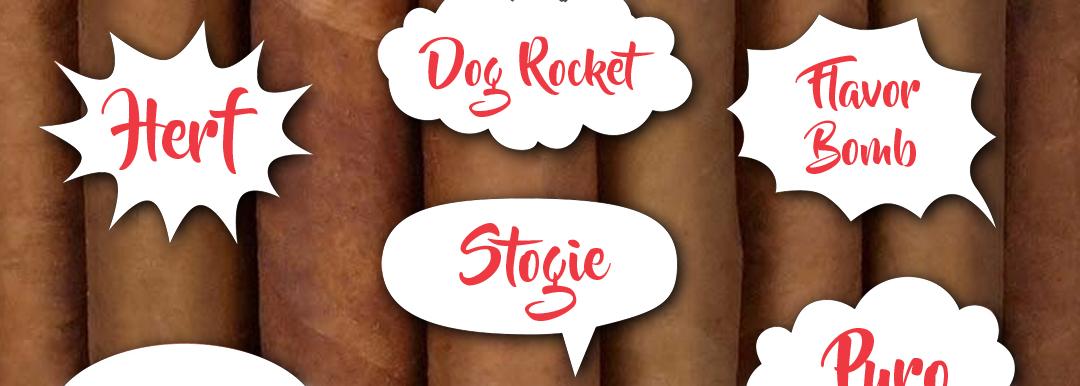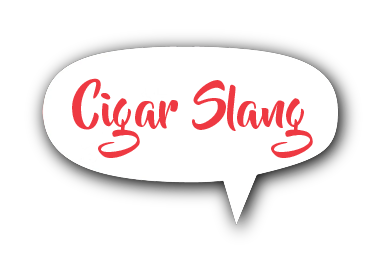Popular Cigar Terms, Nicknames and Slang Definitions

Origin of Cigars

Historians generally believe that the cigar was invented by the ancient Mayans, who would wrap the tobacco in a palm or a plantain leaf and smoke it. Archeologists have even discovered an ancient Mayan pot from the 10th century that depicts a Mayan man puffing on one of these very early cigars.
When Christopher Columbus came over to the New World he was one of the first Westerners to discover tobacco. The local Indians showed him how they smoked the tobacco leaves and Columbus and his lieutenants quickly adopted the habit. When they brought the idea back home, smoking became quite popular in Spain and Portugal.
How did cigars get their name?
The word cigar originally derives from the Mayan sikar ("to smoke rolled tobacco leaves"). The Spanish word, "cigarro" spans the gap between Mayan and modern use. The English word came into general use in 1730.
Cigar Terms, Slang and Nicknames
Slang for cigars is especially helpful for cigar aficionados to communicate distinctively from non-cigar-smokers. You can use any of these slang terms for your stogie, puro, stick or sikar. Stogie is among the most commonly used nicknames for a cigar.
Aging: allowing cigars to 'sleep' in a proper temperature and humidified environment for long periods of time; usually measured in 'seasons' such as winter, spring, summer, fall, and/or years
Aroma: the smell of a cigar being smoked (see also bouquet)
 Barber pole – a cigar made with two different wrappers in terms of origin, color or flavor. The visual effect resembles an old-fashioned barber pole. If properly blended, a barber pole cigar offers very unique flavors and aromas. It's like smoking two different cigars at the same time. Shop barber pole cigars.
Barber pole – a cigar made with two different wrappers in terms of origin, color or flavor. The visual effect resembles an old-fashioned barber pole. If properly blended, a barber pole cigar offers very unique flavors and aromas. It's like smoking two different cigars at the same time. Shop barber pole cigars.
Belicoso: a thick 'shaped' cigar with a tapered pyramid-shaped head and foot, generally with a 52 or more ring gauge. The Belicoso is, traditionally, the shortest of the three vitolas. Shop belicoso cigars.
Belvedere - Belvedere cigars are shorter and thinner than many other types. H. Upmann in Cuba, in fact, made these varieties that were frequently a favorite of President John F. Kennedy.
Binder - There are three components to a premium cigar: the fillers, the wrapper, and the binder. The binder is the tobacco leaf (or leaves) that hold together the filler tobacco. An integral component in a handmade cigar, the binder tobaccos hold the centermost filler leaves in place. Together, the binder and filler tobaccos are called a "bunch." Binders often start out as wrapper leaves, but are classified with a lower grade due to cosmetic imperfections.
Bouquet - Bouquet, or aroma, is the smell of a burning cigar. Great cigars typically have enticing aromas that perfume the room. Sometimes it's difficult to appreciate the aroma of a cigar you are smoking; it often helps to leave the room for a moment and come back, or to cup your hand and direct some smoke toward your nostrils.
Box-Pressed: describes cigars that are actually pressed in their boxes, giving them a somewhat squared-off shape. Cigars are usually packed in two layers in a wide flat cigar box that has an attached flip or hinged lid. Shop box-pressed cigars.

Bundle: another form of packaging, where cigars are sold in sets of twenty-five to fifty, usually tied together with a ribbon. Most bundles are then wrapped in cellophane or paper. Bundles are a relatively recent development within the cigar business, maybe within only the past 50 years. And the bundle "reputation" of cheap stems from two things: the fact that cigars and cigar boxes have been tied together for well over 150 years, and that those first bundle cigars were second-rate in construction and flavor. But not now, quality has improved within the industry, in both growing and manufacturing – they're making a better product. Shop a great selection of bundle cigars.
Butane - A clean-burning, odorless fuel used in many cigar lighters, especially torch models. Cigar smokers prefer butane due to its lack of impurities. Butane is an excellent fuel for cigar lighters because it burns cleanly and will not impart any flavors into the cigar. High-quality butane, or fuel that is refined at least five times, is strongly recommended. Shop butane lighters and fuel refillers.
Candela: several terms are used to designate a green cigar wrapper. Candela is the most popular, but they are also known as claro claro or double claro. Candela wrapper is considered to be the mildest wrapper, conveying a sweet, grassy flavor. Shop Candela green wrapper cigars.
Cellophane - The thin, clear protective sleeves individual cigars are wrapped in are made of cellophane. Although not all manufacturers use cellophane, it provides a safeguard throughout the packaging and transport process of premium cigars. It also inhibits the loss of humidity in a cigar. Additionally, when cigars reach the shelf in a retail shop, cellophane minimizes direct contact and/or the potential damage that can occur, unintentionally, when consumers handle them.One of the most common questions asked is about removing cellophane from a box of cigars. Once you've bought the cigar and are placing it in your humidor, we recommend you remove the cellophane. Learn more about cellophane wrappers and storage.
Cheroot - The term Cheroot that we know today as a cigar that is square at both ends. In South India or the Philippines, it can also be used to describe any cigars that are un-tapered.
Churchill: one of the classic cigar sizes, 7 inches by 47 ring gauge, named after the great British statesman Sir Winston Churchill. The most famous Churchill is the Romeo y Julieta Churchill.
Coolerdor - A popular cigar storage option today is the "Coolerdor." As the name implies, it's made by using a beer cooler for storing your cigars. It makes sense, too. They're well insulated, have a good seal, and will hold hundreds of loose cigars, or a good number of boxes.
Corojo - The most famous variety of Cuban-seed tobacco. First introduced in the 1930s, Corojo-seed tobaccos are now grown throughout Central America. Corojo is slightly darker in color as opposed to a Connecticut wrapper. It is recognized for its pepper and spice. Its flavors are a common favorite among cigar smokers because of its robust flavor that can produce a unique and zesty aroma. Shop Corojo cigars.
Cuban Sandwich - A handmade cigar made with a mixture of long-filler and short-filler tobacco. These cigars are sometimes referred to as mixed-fill cigars.
Cutter - A cigar cutter is a mechanical device designed to cut one end off a cigar so that it may be properly smoked Use a cutter to clip off or open the cap on the head of a cigar so that air can pass through it. The three most common cutters are a straight cutter (or guillotine), a punch cutter, and a V-cutter. Shop all cigar cutters.
Dog Rocket -A slang term for an unpalatable cigar. A dog rocket is a horrible cigar. Of course, taste is subjective, so one man's dog rocket is another man's treasure.
Draw - This is the process of how well you can pull the smoke through the lit cigar while puffing.
Dry Draw - A dry draw is when the air is sucked through an unlit cigar after it has been freshly cut. This is done to allow you to taste its aromas.
Flavor Bomb - A cigar so flavorful it explodes in your mouth with a plethora of big tobacco flavors.
Foot - The end of the cigar that you light is called the foot. It's important to toast the entire foot of your cigar to ensure an even burn and prevent one side of the cigar from burning unevenly or canoeing.
Habano - A Cuban term for a cigar made entirely of Cuban tobacco. Habano cigar wrappers are a common feature on many of the best handmade cigars. The rich golden-brown cigar wraps are popular for their Cuban-seed origins, spicy flavor, and warm aroma and have been grown in places like Esteli, Nicaragua, for several decades now. Shop Habano cigars.
Herf - (verb) to smoke a cigar, in a group of cigar smokers or alone. (noun) a gathering of smokers in one location. The term "herf" was coined during the mid-1990's cigar boom.
Humidor: any sealed room or box used to keep cigars in good condition at 65-70 degrees Fahrenheit and approximately 70 percent relative humidity. Cigars are like fine wine. They need to age before achieving their optimum flavors. Some may need 12 or 24 months to taste their best. Shop humidors.
Maduro: "Maduro" is Spanish for "mature" or "ripe." Maduro wrappers were harvested exclusively from the top of the tobacco plant – the area guaranteed to get dark due to its increased exposure to the sun. The dark, rich brown-colored wrapper; has less aroma and more flavor than the Colorado Maduro; sometimes called Spanish Market Selection (SMS). Shop Maduro wrapper cigars.
Natural - The lighter color and flavor on many Natural wrappers is a result of how the wrapper leaf is processed. Generally, Natural wrapper leaf is grown with less exposure to direct sunlight. Natural cigars are traditionally a smoother cigar with milder flavors and enhanced nutty tones on the front end as well as the way the cigar finishes. People who are new to a cigar brand or new to cigar smoking should usually try Natural cigars before they smoke a Maduro cigar. Shop Natural cigars.
Nic bomb - A nic bomb is a super-strong cigar with powerful flavors that can knock you for a loop, making you dizzy because of too much nicotine.
Nubbing - When the cigar you're smoking offers a lot of flavor and you take it down to the nub because you don't want to let it go, but you also don't want to burn your fingers. This is called nubbing. Many times people will use a toothpick or a cuban roach clip to hold the cigar nub to finish smoking.
Oscuro: the darkest-colored, sun-grown wrapper; very dark brown to black in color, with strong flavor; less common in today's market than Maduro, Colorado, or natural wrappers; sometimes referred to as "Double Maduro". Oscuro leaves are usually from the first priming on a tobacco plant. They grow at the very top of the plant and get the most sunlight. Shop Oscuro wrapper cigars.
Petit Corona: the classic smaller cigar, about 4½" long by 40 to 42-ring gauge (the preferred size by former President John F. Kennedy). The Montecristo No. 4, one of the world's most popular cigars, is a petit corona. Shop petit corona cigars.
Plume - You may have previously heard of something called either "plume" or "bloom", which is said to be the sign of a well-aged cigar. According to cigar enthusiasts, plumes are a natural phenomenon produced during a cigar's aging process. The oils rise to the surface and crystalise as the cigar ages, which resembles a thin layer of white powder on the wrapper.
Puro - Is a popular Spanish name for a cigar; literally "pure" in Spanish; also a cigar made from all locally grown tobacco; in Havana it means any high-grade export type cigar.
Retro-hale – Retro-haling is when you move smoke from the back of your mouth, up through your sinus and out through your nose. By practicing this smoking technique, you will be able to taste and smell a cigar's spices, body, flavor and strength in a single puff. You might have to try it more than once to get the hang of it, though.
Ring Gauge - A measurement for the diameter of a cigar, based on 64ths of an inch. A 40 ring gauge cigar is 40/64ths of an inch thick, a 64 ring gauge cigar would be one inch in diameter. Cigars have grown very fat in recent years.
Robusto - A substantial but short cigar that is thought to be one of the most popular cigar sizes. A Robusto is typically a 5 x 50 cigar that provides a short but full smoke.
Rosado - "rosado" means "rose-colored" and, in the case of cigar wrappers, the Rosado is also known as a Colorado Claro. It is used to describe the reddish tint of some Cuban-seed wrappers. Shop Rosado cigars.
Runners - This occurs while the cigar is being smoked and the wrapper burns unevenly. One of the most common reasons why a runner occurs is if there is a large vein in one of the wrappers. As that vein begins to burn, it acts like a fuse would, traveling all the way down one side of your cigar in just a matter of minutes.
Stick - A very colloquial name for one single cigar.
Stogie - A slang term for any type of cigar, often used to describe cheap or roughly made cigars. The term comes from the long, thin cigars smoked by drivers of Conestoga wagons in the 1700s and 1800s.
Torcedor – A cigar roller in Spanish. Literally "twister" in Spanish. While cigar rolling may look easy, it takes years of practice to roll a perfect cigar.
Vitola – Vitola is a general name for the specific size and shape of a cigar. A vitola can also be referred to as the cigar 'format'. While there are standard and generally accepted vitola names, like Robusto which measures 5"x50rg, manufacturers often create their own unique vitola names for their brands.
Yard 'Gar - Cigars meant to be smoked while you're raking leaves, shoveling snow, or washing the car share one big thing in common: they're cheap. Yard Gars are cigars that are inexpensive, smoke well, taste okay, but don't cause too much stress if they wind up falling into a steaming pile of mulch or run over with the lawn mower.
Thank you for visiting our online cigar shop!
It is our mission to provide you with the best prices, discounts and deals for cigars, humidifiers, lighters, cutters, gifts and other cigar accessories. Shop and browse one of the largest collections of premium cigar brands and samplers.
Cigar Place guarantees the freshness and quality of the cigars and products you buy from us 100%.












